Today was rough. I cannot tell you how many refugees arrived on the shores Lesvos, but I would estimate upwards of 8,000 human beings. The magnitude of this crisis is startling beyond comprehension – and the work to be done of colossal order. Last week saw the highest weekly arrival figures to date: 62,000 people with 8,800 individuals arriving in Greece EVERY SINGLE DAY. The majority are Syrian (66%, according to this recent UN report – thank you Molly for sharing), 21% from Afghanistan, 6% from Iraq, and the rest a mix of Somalia and other nationalities. I spent the day on the northern coastline of Lesvos, this island which has received 300,000 of the half a million people who have arrived in Greece this year. And yesterday, dare I say it, the numbers seemed even higher. The influx of people coming from the sea is endless.
Eager to learn the personal stories behind the faces before me, I spoke with hundreds in near-faultless English and probed about their lives and journeys to this point. The refugees arriving by boat are not impoverished people, by and large, particular the Syrians – case in point: a doctor, a tech guru, college graduates with liberal arts degrees. These are educated, working professionals, who have been forced to leave their countries and are seeking a better life for their families. That kills me, adding a whole other layer of complexity.
I began the day with a drive to the north – passing Oxy, the transit camp which was clearly over capacity at 9am, hundreds of people lining the streets with blankets, bags, and clothing heaped beside them. A steady stream of people making the trek uphill toward the camp from wherever their boats had landed. When we arrived at the end of the road in the north – where it becomes an overrun dirt trail of sorts – we were met by a massive crowd of thousands, a few volunteers attempting to create some semblance of order. I asked what needed to be done, “GET THEM IN A LINE, FOR CHRIST’S SAKE!” one British man with a bright yellow vest shouted exasperatedly at me. “Done,” I replied – and began working my way down the line. I have found kindness, camaraderie, and humility far more effective tactics in achieving goals than hostile 'us vs. them' strategies. So I danced and smiled, hugged and apologized my way through the masses, moving them back and to the side by walking with and among them, yielding some sort of line (albeit multiple people wide) that did not entirely block the road for passing cars. We loaded the first few buses, fifty seats each, plus dozens of children on laps – an arduous task when families, most of which number in the teens and twenties, cannot be separated for risk of not being processed together in the camps.
I cannot blame people for rushing the bus doors in desperation; would you not do the same? The walk from the seaside to Oxy is seven kilometers under the beating sun (or whipping winds, if early morning or late afternoon), mostly up steep hills, and takes two and a half hours, walking at the pace most are able to manage with bags, babies, and exhaustion. These buses are the only other option, no taxis to be had, though many refugees do ask if alternate modes of transportation exist, for which they are willing to pay. I tried to pick out the pregnant women, nursing mothers, old folks with canes, people with broken limbs or sprains (mostly young men who had injured themselves in attempts to bring their boat ashore safely), or those with signed medical notes about heart conditions or the like – and ever-so-delicately, bring their families to the front. As the hours passed, the crowd only grew in size and intensity. No one became violent, but the scene was largely unmanageable, with people pressed tightly against one and other from one side of the road to the other and right up to the bus itself. This became a particular problem when a local or aid worker’s vehicle needed to pass. We attempted to corral the people to one side, resurrecting the rope system that been quickly disregarded, but it was largely to no avail.
The scene reached a low point, to say the least, when one tiny girl, perhaps four or five years old, had her foot pinned to the ground by the tire of a car attempting to get by. I heard a scream, then mad shouting and ran over – to find a visual I never wish to see again in my life. Her shoe was quite literally under the rubber, unable to move. The driver panicked, driving neither forward nor back in fear of injuring her further. Advised by a doctor, who identified himself in an instant, we pulled her foot as far away from the car as possible and had the driver roll backwards just a smidge. Her foot was released, she wept, her father hugged his daughter, and we all breathed a brief sigh of relief, before the doctor cautiously removed her sock and shoe to examine her foot, which was someone miraculously unscathed. The heel of her too-large shoe was mangled, but her foot had not felt the brunt of the vehicle’s weight. After that horrifying scare, we returned to face the increasingly unruly crowd. By mid afternoon, we had to break the news that this would be the final bus, at least for a few hours, and that the remaining thousands would have to make that daunting trek to Oxy on foot, navigating roads they did not know to a destination we only spoke of. To say that loading it was physically and emotionally taxing is an understatement; I stood at the foot of the bus stairs, bracing myself with all four limbs against the metal doorjamb to keep from being forced to the ground entirely. People begged, pleaded, pushed, placed their children in harm’s way, did whatever they could to convince me that they should fill the final seats. It was all I could not to break down crying right then and there. I had already spent hours apologizing to people, trying to explain in my broken broken Arabic or through my Farsi translator (Hoymayoon was my trusty pal all day, before his family made it onto the last bus) that we were doing our very best – that if I had a bus, I’d take all of them right away… or better yet, a plane, so I could fly the whole of them directly to wherever they wished to go. They smiled; none were angry with me, simply hoping to advance to the next step of this harrowing and unknown ordeal.
When the last boat left, I walked to the edge of the dirt road, where hundreds were seated on rocks, eating spam out of cans with pita, as they awaited the arrival of remaining family members who were walking up from the sea’s edge. I hopped in a big van with a man from Team Humanity, a two-month-old organization founded by a couple dozen Danish twenty-somethings who had raised grassroots funds, rented two mini buses in Sweden, and drove them to Greece, where they stepped in to do whatever was most needed, mostly shuttle those who were unable to walk from point to point around the island. We made the climb up the partially-washed out and highly overused dirt road and down the other side to the coast, which was quite literally orange: blanketed in discarded life jackets. We picked up some mothers and children along the way, driving them to Skala, a transit camp on the northern shoreline, where they would then be bussed elsewhere. That camp was completely overridden, with throngs of newly arrived Somalis unable to even enter, huddling on the street for warmth while munching on crackers doled out by volunteers.
We picked up another group on the drive back, heading in the other direction, toward Oxy. Stopping to welcome a boat ashore, a man approached me, asking to take him, his wife, and three toddlers to a place where he could see a doctor – he lifted his sopping wet pant leg to reveal a prosthetic leg. Sure, I said, and packed Ali and family into the back of the car (earlier that day, the Team Humanity folk said they had packed 25 people in!). As they loaded in their bags, drenched and weighted down, I watched as a team in wetsuits brought a damaged boat ashore. Surreal. Forty people disembarked the rubber dingy designed for no more than twenty, delighted to have made it to European soil without capsizing or sinking, fates which too many shoddy boats are subject to.
Once at Oxy, I walked Ali and his family to the medical tent, holding a smiling Hamsa (his son, who took to kissing my cheek!) on my hip as we made our way through the unimaginable crowds. He was seen right away – and I left, to call Jodi to come scoop me up, as the sun was setting and I was growing quite hungry. She and I had parted ways early in the day, when Jodi left the bus loading area to drive two one-month-old twins to the hospital with their parents – and had proceeded to act as a taxi for the remainder of the day for those who needed it most, offering up lollipops and snacks, much to the delight of her lucky passengers. (Side note: did you know that it is currently illegal to pick up refugees who are walking the roads of Lesvos? Food for thought.) While awaiting Jodi’s arrival, I walked the crowds, asking people what they needed. Most had questions about when their bus would leave; after waiting in a line of four of five hours, the refugees were registered and allotted tickets (small pieces of paper that volunteers made on a paper cutter by the harbor with symbols drawn in magic marker – clouds, hearts, crowns), then given a white bread sandwich, banana, and small bottle of water, and told to wait until their bus was called, in sequential order. Most of the buses would not depart for Mytilini until morning, the port city with the main processing camps – one for Syrians and a second for all other refugees (due to differing legal statuses, to be discussed later) – and ultimate ferries to Athens, where they would continue their journeys onward. Others wanted blankets, which had run out, though it was getting increasingly cold, as the skies neared pitch black. One man, a Syrian dressed in a Nike beanie, brand new red Nike sneakers, running pants, and athletic hoodie, with shiny aviators and a monogrammed leather money belt – who could have been a David Beckham double in a photoshoot – asked for a plug to charge his iPhone. We tried unsuccessfully to find an outlet, chatting all the while (in perfect English!) about Medhi’s love of American culture and desire to one day make it all the way from Aleppo to the States. A few folks who I had spoken with earlier in the day stopped me to say hello, to ask a question, to thank me for my patience and goodness. I hugged them all! One thirty-something Syrian man, Wadi, reminded me that he would see me in the US one day, showing off his fantastic tattoos about skateboarding and music – two of his great loves, along with American girls, he whispered with a smile! This guy was ready for Venice Beach with his man bun, scruff, earrings, tats, and hobo chic attire (clearly deliberate, and in stark contrast to his traditionally well-dressed peers).
Jodi found me talking to Homayoon, the Afghan man who had acted as my flawless Farsi translator all day. He and his family were now waiting for their bus, proudly showing me his pink ticket. Jodi is a master Periscoper (follow her/us @rothjodi) and decided to broadcast video live from Oxy, where she magically got full data signal. I briefed her viewers on what was happening and then began asking Homayoon questions live on air. He began his journey in Iran, where he worked in cell phone technology, but could never receive full citizenship privileges, despite living their for over 30 years, because of his Afghan identity. They paid $1000 per person – himself, sister, brother, mother, father – to a smuggler to cross the mountains in Turkey on foot, where they ate only one meal in three days, then went out of pocket for a hotel in Turkey, before paying another $1000 per person for the dingy journey to Greece, both illegal crossings. I asked what he brought with him: lots of water, a pen (because he signs so many forms!), medicines, money (but not too much, for fear of being a target or robbed), clothing, and his cell phone; that’s it, because the load should not be too heavy, he told me. I cannot even begin to imagine. I embraced him, marveling at such strength and bravery.
We finally left Oxy long after dark, and made our way to the harbor for food – fava ban dip and tomato-garlic braised eggplant. A coast guard boat pulled in as we finished our meal; unable to see the figures in the distance, we heard the ruffling of mylar emergency blankets. Jodi and I went over to help dole out dry clothing, beginning with the babies, as these people’s boats had sunk to many feet below the surface before being rescued. We got creative with rope belts and layering to make the clothes fit; dry anything is better than sitting in drenched fabric in the freezing cold nights. I asked if they were hungry, met with a resounding “yes” – and asked another volunteer if she could go fetch sandwiches, a must which had somehow been overlook in the chaos of the arrival.
I got to talking with one Syrian family, bonding over the fact that their daughter was also 24 and loved to cook. I conversed mostly with her cousin, Rami, a recent graduate of university in Damascus with a degree in natural sciences, who had moved to Saudi Arabia to avoid being forced to fight in the Syrian army. “I will never kill my own people. You’ve got to be crazy,” his views on his government were clear with those pointed words. He felt suffocated, “like there was a noose around my neck,” in Saudi Arabia, unable to work due to harsh employment restrictions on foreigners – so he left. This family, as is true of many I have spoken with, hopes to make it to Sweden, where they have relatives.
My conversations with children are the best. I went over to a boy to bundle him up and wrap his head in a blanket. “What’s your name?” I asked. “Amwasaam,” I heard him reply. “Amwasaam?” I repeated. “No… I. Am. Wasaam,” he broke it down for me. His initial response in perfect English, with a subject and verb, had caught me by surprise! “How old are you?” “Seven. And this my mother.” He pointed to the woman standing behind me. I smiled and hugged her. What a little man – with curls and dimples to match his intellect! We bid these new arrivals adieu and retired, exhausted and hugely grateful for the roof over my head, this Patagonia fleece, and a hot shower – though with a heavy heavy heart.
I could have stayed out there all night; I would have. For some reason, I seem to be hardwired differently – and find myself completely comfortable, even at home, alongside these extraordinary human beings, whose plights I cannot imagine as my own, yet whose stories and humanity I relate to at the cellular level. I know not what tomorrow holds, but here I am – to do, people to people, human to human.

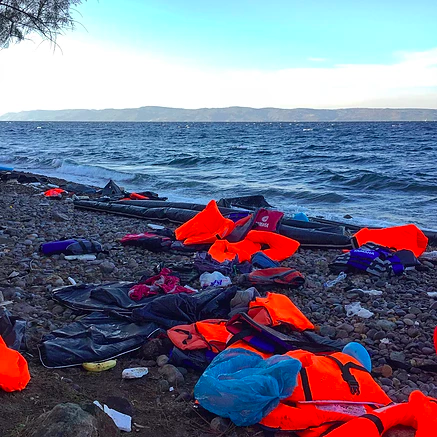

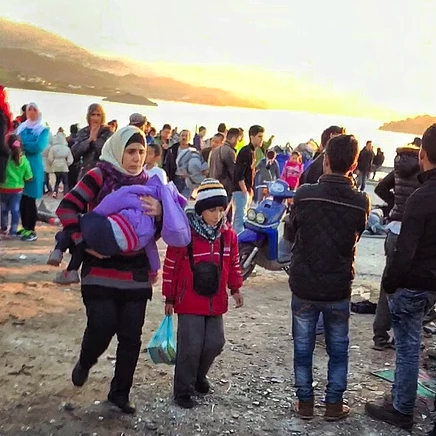

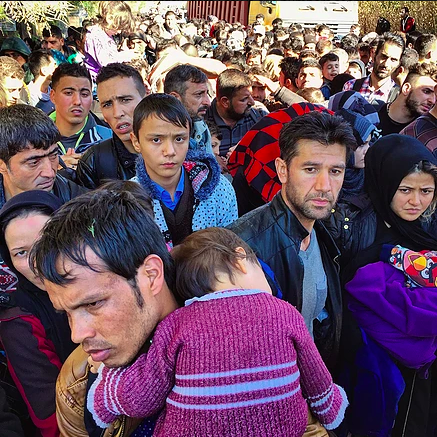

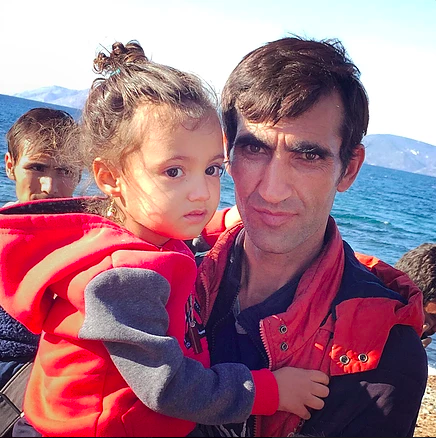

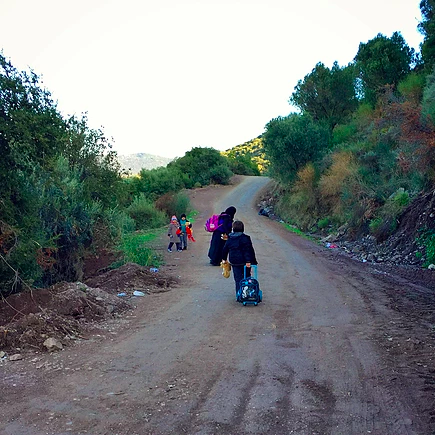
Comments